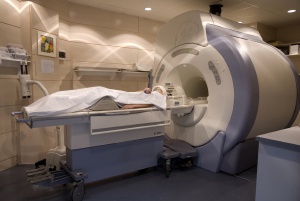Jan 28 2009
A study led by researchers from Catalonia analyses the importance of the use of magnetic resonance imaging to improve the diagnosis and treatment of patients in a vegetative state. Until now these tests have not been performed in this type of patient. The results show activation of the auditory and linguistic areas of the brain despite the absence of observable behavioural responses.
 Magnetic Resonance Imaging Machine at the Hospital San Carlos, Madrid. Photo: SINC
Magnetic Resonance Imaging Machine at the Hospital San Carlos, Madrid. Photo: SINC
The aim of this study is “to analyse the response of the brain to language in a group of traumatised patients in a vegetative state or in a minimally responsive state”. The patients were examined using the technique of functional magnetic resonance imaging”, explains Carme Junqué to SINC, who is the principal researcher of the project at the University of Barcelona (UB) in collaboration with the University Institute of Neurorehabilitation in Guttman.
To test the areas of the brain involved in language comprehension in these patients showing no evidence of motor response, the research team performed magnetic resonance imaging on seven patients, three of whom were in a vegetative state and four in a minimally responsive state.
In this study, which will continue until the end of 2010, four of the seven patients showed cerebral activation in response to sound comparable to activation found in 19 healthy volunteers. Amongst these, there was one patient in a vegetative state and another in a minimally responsive state who both showed an appropriate activation in the areas of the brain involved with language processing when listening to various extracts from stories.
Until now the routine clinical tests these patients underwent, were not capable of detecting whether or not there was a cerebral response to language. However, the researcher tells SINC “although they look or cry, we do not know whether or not the patient is processing the information, whether they do it automatically or whether they do it consciously.
The interesting thing about the results obtained with the magnetic resonance imaging is that the evidence of comprehension of the language stimulus means a better prognosis and a change in the way they are treated by relatives and therapists.
The results show that when some of these patients listen to extracts from stories, for example short sentences such as “a person is walking by the sea and is listening to the waves”, complex areas of the brain are activated, “which suggests that the patients possess areas of perception in the brain where the information arrives”, the researcher confirms to SINC.
Studies such as this one do not make it possible to conclude that the patients “understand” language in the way that healthy people do, but they do confirm that the patient’s neural networks still work to guarantee this complex cognitive function. “As a result, this can lead to a substantial change in the motivation of carers and can be very useful in choosing the rehabilitative interventions”, Junqué emphasises.
What happens after craneoencephalic trauma?
After serious craneoencephalic trauma the patient experiences a phase of coma. Following this they can recover consciousness or progress towards what we call “a vegetative state”, which is characterised by the preservation of sleep-wake cycles, the autonomic control of respiratory and cardiac functions, and the absence of any evidence of self-awareness or the surroundings.
Patients are incapable of reacting to stimulation intentionally and do not show any ability to communicate. A patient can survive for years in a vegetative state or recover partial consciousness progressing towards what is known as a “minimally responsive state”.
Until now, the diagnosis of these patients has been based on exhaustive clinical assessments of the patient’s spontaneous behaviour in order to assess whether the patient is capable of perceiving or interacting with their surroundings, namely, whether they have the preserved complex mental capabilities in the absence of motor response.
At the present time, there is an intense debate in the clinical, legal and ethical domains about the suitability of the assessment protocols used for the diagnosis of these patients and the possibility of implementing rehabilitation programmes more suited to individual differences.